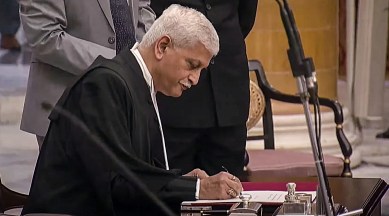Stay updated with the latest - Click here to follow us on Instagram
CJI bench to hear EWS quota, reservation for Muslims in Andhra
Second Constitution bench to take up pleas against some Muslim personal law

A five-judge Constitution bench of the Supreme Court headed by Chief Justice of India U U Lalit will take up two pleas dealing with reservation from September 13.
Another Constitution bench headed by Justice Indira Banerjee, which also met on Tuesday, fixed the second week of October to take up for hearing petitions challenging constitutional validity of the practice of polygamy and nikah halala permitted by Muslim personal law.
monthly limit of free stories.
with an Express account.
A Constitution bench was last set up in September 2021 to hear a power purchase dispute, but the parties settled their differences out of court. but the parties settled it out of court. No other Constitution bench was set up during the previous CJI’s term.
On Tuesday, the CJI bench said it will hear the matter for two-and-a-half hours on Tuesday, Wednesday and Thursday (September 16-18) and try to complete hearing one case in a week’s time.
While one of the petitions before the CJI bench challenges the constitutional validity of the 103rd Amendment Act, 2019, which introduced the provision for a 10-per cent quota for Economically Weaker Sections (EWS), the other, pending since 2005, pertains to reservation given to Muslims in Andhra Pradesh as a Socially and Economically Backward Class (SEBC) and raises questions of religion-based reservation.
“The unanimity among us is…1 (Muslims as SEBC) and 4 (EWS quota). Everybody is agreeable that these are perhaps interlinked matters. Therefore, (in) the kind of submissions, there may be a bit of overlap. So we will take up 1 and 4 together,” CJI Lalit said after consulting the other judges on the bench — Justices Dinesh Maheshwari, S Ravindra Bhat, Bela M Trivedi, and J B Pardiwala.
The bench initially planned to hear it starting September 6. But senior advocate Kapil Sibal said that these are “very contentious and complicated matters and speaking for myself, I have not applied my time, my mind fully”, and sought more time.
The bench then agreed that it will list the matter for September 6 for directions. “Everyone of you will be aware as to how much and where he or she stands; then we can list the matter a week thereafter,” the bench said.
Attorney General K K Venugopal said the EWS quota matter is “very important”. Solicitor General Tushar Mehta then urged the court to consider taking it up first. The bench agreed to the request.
In an interview to The Indian Express on August 14, CJI Lalit, in response to a query on cases not being heard, had said that he will try to have at least one constitution bench sitting throughout the year. “What you touched upon is that some matters don’t get listed. That is something which, at the institutional level, we will have to find a solution to (in a way that) there won’t be any room for such criticism,” he had said.
He said that “one idea for an institutional response” is “to have Constitution benches sit all year. There must be avenues where these matters can immediately be taken up.”
On Monday, the court notified the setting up of two constitution benches, one headed by the CJI and other presided over by Justice Banerjee and comprising Justices Hemant Gupta, Surya Kant, MM Sundresh and Sudhanshu Dhulia.
The bench headed by Justice Banerjee issued notices to the National Human Rights Commission, the National Commission for Women, and the National Commission for Minorities on the plea filed by some Muslim women and others challenging the practices.